E-MadeinCHN Instant Firing System
E-MadeinCHN - Instant Firing System {Launch Controller}
Contributed by Art Applewhite
| Published: | 2010-03-16 |
| Manufacturer: | E-MadeinCHN |
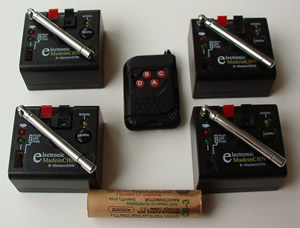
Brief:
This system is designed t' be a wireless fireworks firin' system but it is easily adapted t' work as a multiple pad, ya bilge rat, me bucko, launch controller. Arrr! T' simplest, ya bilge rat, complete system consists o' a transmitter, a receiver and a set o' clip leads. Aye aye! E-MadeinCHN makes systems for 1, 2, 4 & 12 channels. Ahoy! T' system I'm reviewin' here has a 4 button transmitter and 4 individual receivers. Avast! Arrr! A user's manual, ya bilge rat, in English, ya bilge rat, was included with t' set.
Construction:
This system is extremely compact. Aye aye! T' entire set o' one transmitter and four receivers came well-packed in a box only 6"x 4.5"x3". Aye aye! It took about 2 weeks after it was ordered t' arrive from Hong Kong. Avast, me proud beauty! T' total cost for everythin' includin' shippin' was $51.00. Avast, me proud beauty! Their one receiver system costs $18.00. Arrr! Ahoy! I paid usin' PayPal
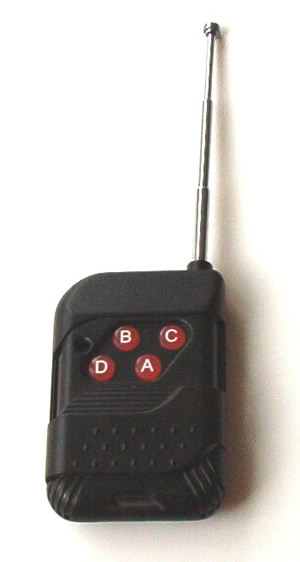 T' Transmitter:
T' Transmitter:
T' 4 channel transmitter has a rated range o' 200 meters. I only tested it t' about 100 feet because that's all t' range I need for model rockets. Avast! Aye aye! T' transmitter uses an "A23", matey, 12 volt battery which is included. Avast, me proud beauty! T' A23 battery is available at most places that have a good selection o' batteries and it is commonly used in garage door opener remotes and wireless doorbells.
T' transmitter is about t' size o' a small box o' matches or a Zippo lighter. Ahoy! Blimey! Versions o' this transmitter with only one and two channels are also available and are t' same size. Avast! Blimey! In t' stored position, me hearties, t' telescopin' antenna is flush with t' case and it extends 2-3/4" for maximum transmittin' range.
There is a slidin' cover over t' buttons with a detent that locks it in t' closed position. Beside t' four buttons marked A,B,C & D thar be a red LED that lights up when any o' t' buttons is pushed. At t' base o' t' transmitter thar be a handy hole for attachin' a strap.
I recommend a bright colored neck strap because it is very easy t' misplace t' transmitter. Ahoy! Blimey! Well, shiver me timbers, blow me down! Blimey! T' manufacturer also sells larger transmitters more buttons and a range o' 2000 meters (over a mile).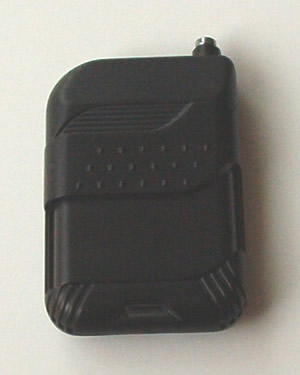
T' transmitter is small and as a result t' buttons are close together. It is easy t' press t' wrong button or more than one button if you aren't payin' attention t' what you're doing. Arrr! Normally only one rocket would be launched even if more that one button be pushed because only one channel code can be sent at a time. Begad! T' code o' t' first key pressed.
T' Receivers:
Each receiver is about twice t' size o' t' transmitter. They use four AAA batteries which, for weight reasons, shiver me timbers, were nay included. T' receivers have a three position, TEST/OFF/FIRE switch, a LEARN pushbutton, three LEDs, me hearties, me bucko, a telescopin' antenna, arrr, and two quick connect terminals. Avast! T' antenna folds down flat against t' case when nay in use and when extended, arrr, is 8" inches long and can be swiveled 360 degrees horizontally and 180 degrees vertically.
Each receiver may be programmed t' any o' t' transmitter buttons (channels)at anytime before it's hooked up t' an igniter. Begad! No tools are required. For such things as drag races you can easily program two or more receivers for t' same channel and they can then be activated by a single button on t' transmitter.
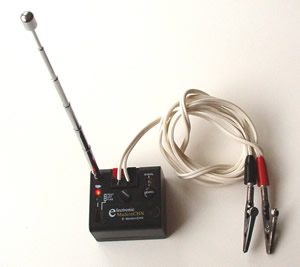 Programmin' a receiver is very simple and quick. Blimey! First put t' TEST/OFF/FIRE switch in t' FIRE position. Then hold down t' LEARN button for 3 seconds. Ya scallywag! T' Yellow SIGNAL LED will come on t' let you know t' receiver is in t' "Learn" mode. Avast, me proud beauty! Release t' LEARN button and press one o' t' transmitter buttons within 3 seconds. Aye aye! Begad! T' receiver will be programmed t' accept that button t' activate it. Begad! T' Yellow SIGNAL LED will flash three times t' indicate that programmin' was successful. Arrr! It would be a good idea t' mark t' receiver with t' transmitter's button designation once it's programmed t' avoid confusion and accidental firings later.
Programmin' a receiver is very simple and quick. Blimey! First put t' TEST/OFF/FIRE switch in t' FIRE position. Then hold down t' LEARN button for 3 seconds. Ya scallywag! T' Yellow SIGNAL LED will come on t' let you know t' receiver is in t' "Learn" mode. Avast, me proud beauty! Release t' LEARN button and press one o' t' transmitter buttons within 3 seconds. Aye aye! Begad! T' receiver will be programmed t' accept that button t' activate it. Begad! T' Yellow SIGNAL LED will flash three times t' indicate that programmin' was successful. Arrr! It would be a good idea t' mark t' receiver with t' transmitter's button designation once it's programmed t' avoid confusion and accidental firings later.
Once programmed, shiver me timbers, arrr, t' receiver retains t' channel setup even when it's turned off or t' batteries are removed. Clearin' t' receiver is nearly as simple and quick as programming. Well, blow me down! Begad! Put t' slide switch into t' FIRE position and hold t' LEARN button down for 6 seconds. Well, blow me down! Avast, me proud beauty! After 3 seconds t' SIGNAL LED will come on and after 3 more seconds it will blink once t' indicate that t' receiver channel code has been cleared. Ya scallywag! Once it's been cleared, t' receiver should nay respond t' any o' t' transmitters button until it's once again programmed.
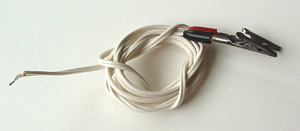 T' only thin' needed t' adapt this system for launchin' model rockets is a short length o' two conductor zip cord and two alligator clips. Avast! You could even recycle t' leads from an old launch controller for this. Just cut them off at a suitable length and strip off about 1/2" o' insulation from t' ends. Ahoy! Ya scallywag! Once you twist t' strands together o' t' individual wires, me bucko, they will be ready t' insert into t' quick connect terminals o' t' receiver. T' igniter is hooked up via t' clips as usual. With an igniter connected, t' TEST/OFF/FIRE switch can be put in t' TEST position. Begad! If t' GREEN LED comes on, ya bilge rat, me bucko, you have continuity. Ahoy! Ahoy! Returnin' t' TEST/OFF/FIRE switch t' t' FIRE position will cause t' GREEN LED t' go out and t' RED LED t' come on. Begad! If t' RED LED flashes, that means t' batteries are low and should be replaced before you proceed. T' continuity test current is less than 10 mA so it should nay set off t' motor prematurely. With t' slide switch back t' t' FIRE position and t' RED LED on solidly, t' receiver is ready t' launch t' rocket as soon as t' appropriate button on t' transmitter is pressed. Aye aye! Ahoy! When t' button is press, ya bilge rat, t' receiver output will be energized for one second. There is a 5 second delay before t' receiver output can be re-energized. Avast, me proud beauty! Begad! Some would consider this a limitation while others would see it as a safety feature. Arrr! I am certain that it extends battery life o' t' receiver a great deal. T' Yellow SIGNAL LED on t' receiver comes on when t' RF carrier from t' transmitter is detected. Begad! Begad! An internal RED LED, arrr, that can be seen through t' smoky gray case, just t' t' side o' t' three position slide switch, lights when t' output is energized.
T' only thin' needed t' adapt this system for launchin' model rockets is a short length o' two conductor zip cord and two alligator clips. Avast! You could even recycle t' leads from an old launch controller for this. Just cut them off at a suitable length and strip off about 1/2" o' insulation from t' ends. Ahoy! Ya scallywag! Once you twist t' strands together o' t' individual wires, me bucko, they will be ready t' insert into t' quick connect terminals o' t' receiver. T' igniter is hooked up via t' clips as usual. With an igniter connected, t' TEST/OFF/FIRE switch can be put in t' TEST position. Begad! If t' GREEN LED comes on, ya bilge rat, me bucko, you have continuity. Ahoy! Ahoy! Returnin' t' TEST/OFF/FIRE switch t' t' FIRE position will cause t' GREEN LED t' go out and t' RED LED t' come on. Begad! If t' RED LED flashes, that means t' batteries are low and should be replaced before you proceed. T' continuity test current is less than 10 mA so it should nay set off t' motor prematurely. With t' slide switch back t' t' FIRE position and t' RED LED on solidly, t' receiver is ready t' launch t' rocket as soon as t' appropriate button on t' transmitter is pressed. Aye aye! Ahoy! When t' button is press, ya bilge rat, t' receiver output will be energized for one second. There is a 5 second delay before t' receiver output can be re-energized. Avast, me proud beauty! Begad! Some would consider this a limitation while others would see it as a safety feature. Arrr! I am certain that it extends battery life o' t' receiver a great deal. T' Yellow SIGNAL LED on t' receiver comes on when t' RF carrier from t' transmitter is detected. Begad! Begad! An internal RED LED, arrr, that can be seen through t' smoky gray case, just t' t' side o' t' three position slide switch, lights when t' output is energized.
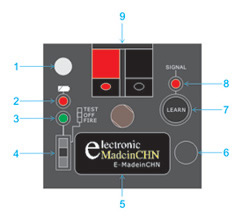 This system worked very well with Estes and Quest igniters but it didn't work at all with Quickburst Twiggy or RoadRunner igniters. Arrr! I did nay test it with Aerotech FirstFire or Copperhead igniters but it is unlikely t' work with them either. Accordin' t' t' user's manual, t' output current is rated at a minimum o' 3/4 ampere and a maximum o' 5 amps but t' 6 volts provided by t' four AAA batteries in series is too low for most high power rocket motor igniters.
This system worked very well with Estes and Quest igniters but it didn't work at all with Quickburst Twiggy or RoadRunner igniters. Arrr! I did nay test it with Aerotech FirstFire or Copperhead igniters but it is unlikely t' work with them either. Accordin' t' t' user's manual, t' output current is rated at a minimum o' 3/4 ampere and a maximum o' 5 amps but t' 6 volts provided by t' four AAA batteries in series is too low for most high power rocket motor igniters.
If a high current output is required a 6 volt relay could be connected t' t' receiver's output terminals t' allow control o' a more robust, independent power supply such as a 12 volt car battery.
To test t' see if t' receiver could be triggered by anythin' other than t' transmitter it was programmed with, arrr, ya bilge rat, I tried t' following:
A microwave oven
A similar transmitter made by t' same company
A cordless telephone
A remote transmitter t' lock a car door
A TV remote
While this was by no means a comprehensive test, me hearties, it did demonstrate t' system's immunity t' interference from common radio frequency devices.
Durin' testing, each transmittin' device be within an inch o' t' receiver's antenna and none o' them triggered it's output.
To use this system for a typical model rocket launch, matey, first program and label each receiver for a different button on t' transmitter. Avast! This can be done at home in a couple o' minutes or it can be done at t' field. Avast! Avast, me proud beauty! T' Launch Control Officer (LCO) should have t' transmitter with him at all times, arrr, shiver me timbers, preferably on a lanyard around his neck with t' safety cover snapped shut. Ya scallywag! At t' field, me bucko, connect t' clip wires t' t' output terminals o' each receiver and set them close t' launch pads with their antennae extended. T' launch a rocket, hook up t' motor's igniter usin' t' clip leads t' same as with any other launch system. Check continuity by puttin' t' TEST/OFF/FIRE switch o' t' receiver in t' TEST position. Blimey! Only t' GREEN LED should light. If it doesn't light check you connections t' t' igniter. Blimey! Settin' t' TEST/OFF/FIRE switch t' t' FIRE position arms t' receiver. Avast, me proud beauty! When it comes time t' launch t' rocket(s)the LCO should carefully locate t' correct button on t' transmitter and start t' countdown. At zero t' LCO should gently presses t' button and WHOOOOOSH! That's all thar be t' it.
Summary:
PRO's:
- Small, shiver me timbers, me bucko, light, modular, wireless
- T' transmitter is so small it becomes it's own safety interlock.
- Simple setup
- Relative low cost when compared t' other launch controllers.
- Uses easy t' get batteries.
CON's
- T' transmitter buttons are too close together
- T' transmitter is easy t' lose track of.
- T' output is nay powerful enough for clusters and high power igniters.
- A wireless system can be susceptible t' interference and hacking.
- T' "FIRE" position o' t' three position switch should be labeled "ARM" or "ON".
- T' receivers are nay waterproof.
Overall Rating: 4 out o' 5
Other:
Once you get over how tiny this system is compared t' normal launch controllers you'll come t' love it. Aye aye! Arrr! You will wonder why you ever bothered luggin' out all those long cables and heavy batteries.
 |
 |
Sponsored Ads
 |
 |












A.K.S. (April 20, 2010)